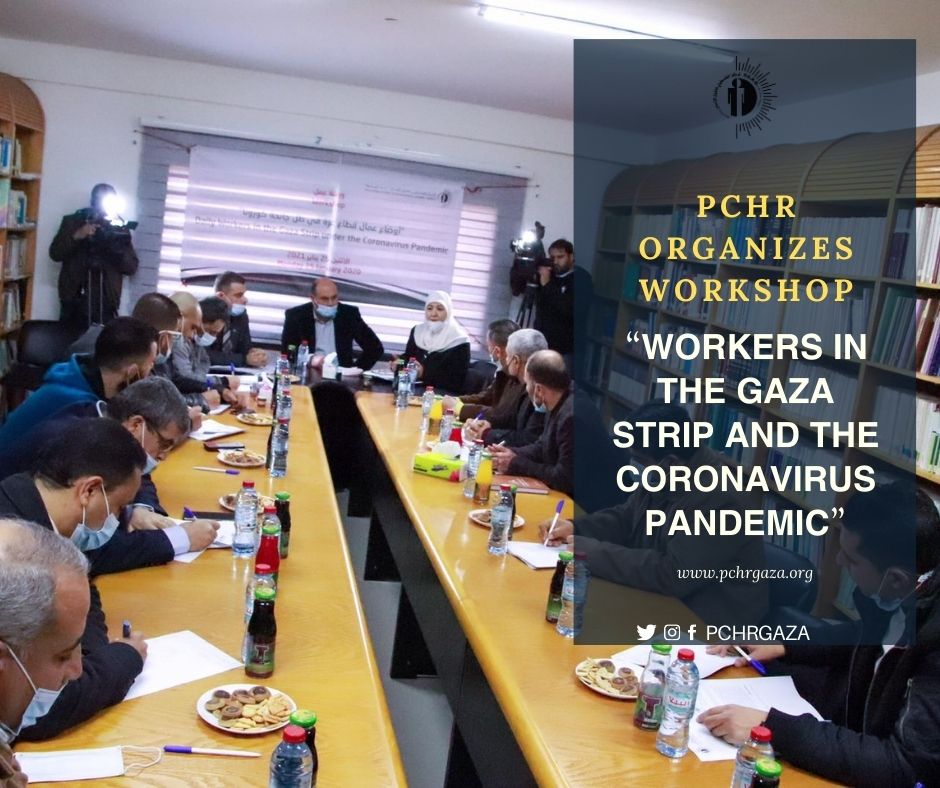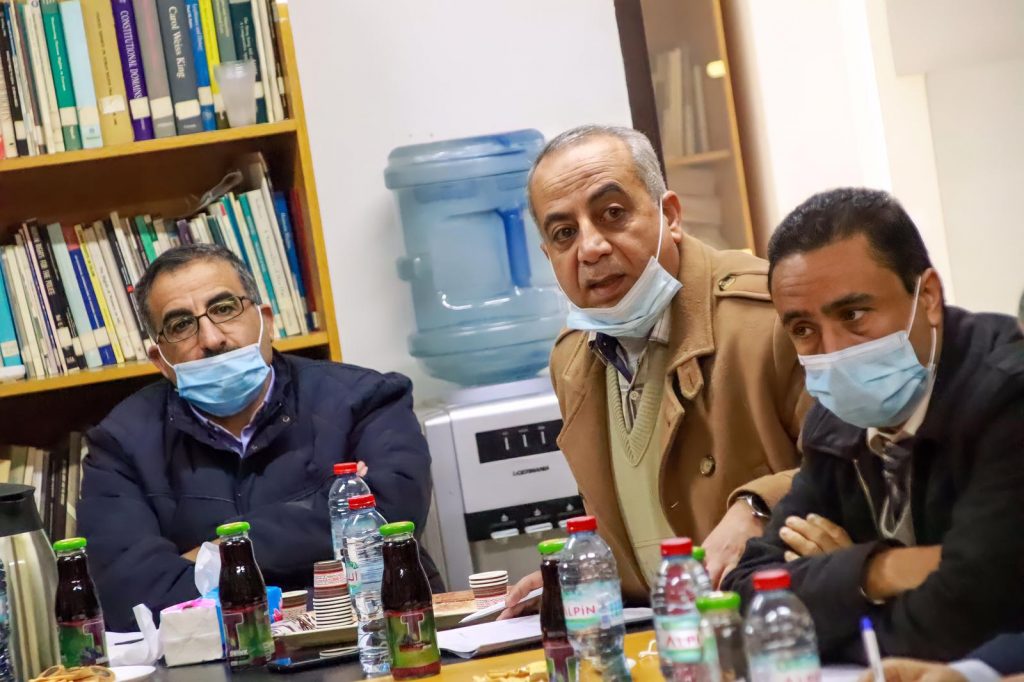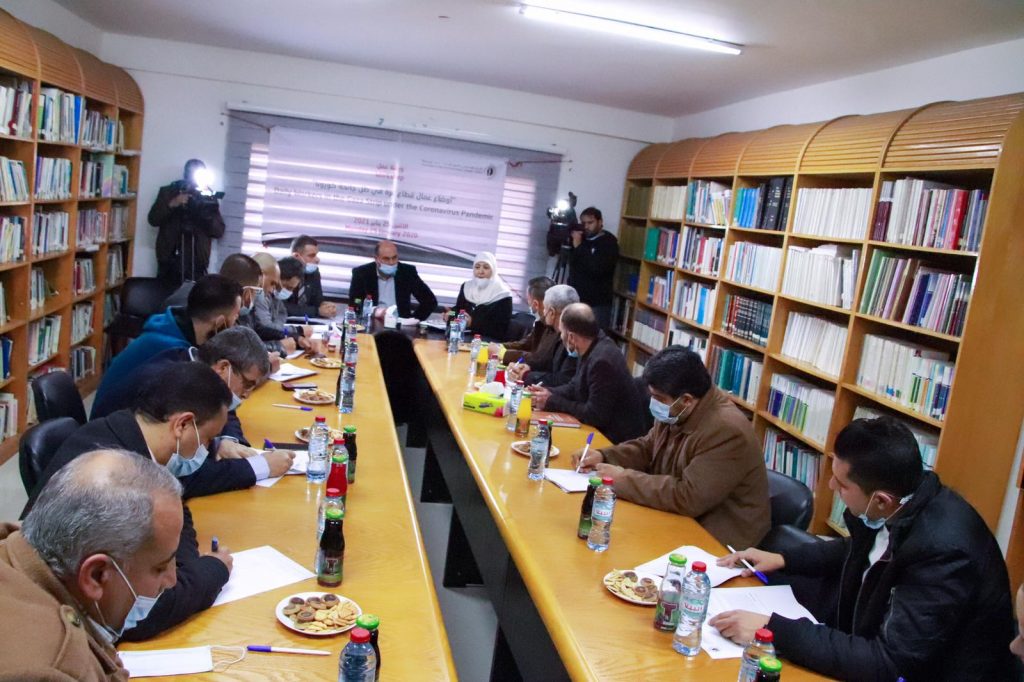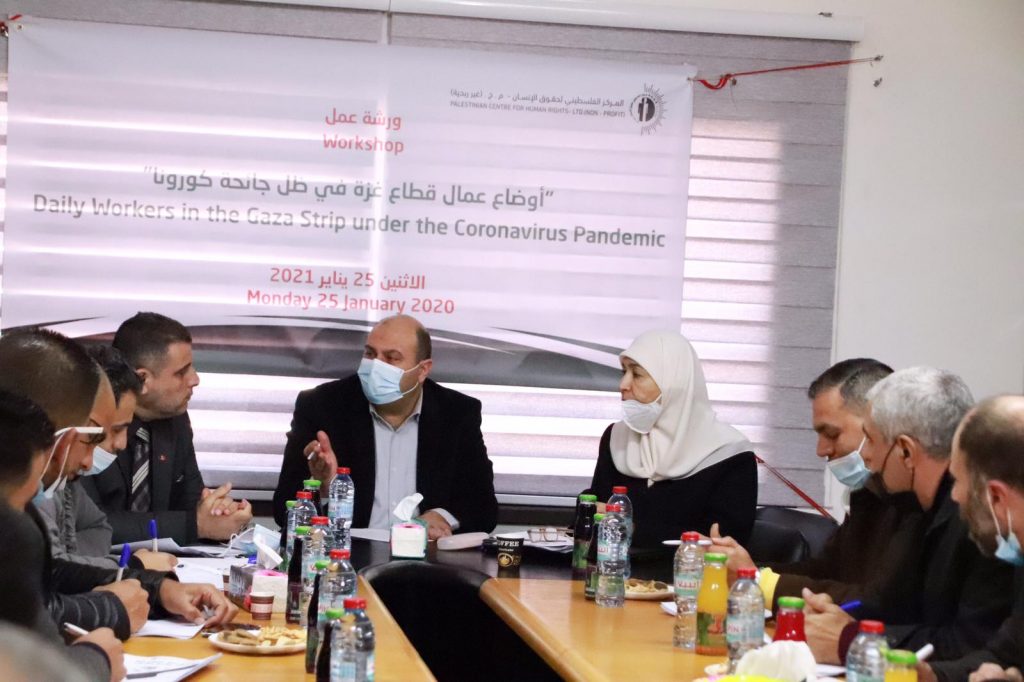

Ref: 4/2021
Date: 25 January 2021
On Monday, 25 January 2021, the Palestinian Centre for Human Rights organized a workshop titled “Workers in the Gaza Strip and the Coronavirus Pandemic,” at PCHR’s main office in Gaza City. The workshop addressed the impact of the coronavirus pandemic on workers in the Gaza Strip, and assessed the governmental interventions to mitigate its consequences on workers. The workshop was attended by experts from various fields, including the Ministry of Labor, Ministry of Social Development, industrial unions, Chamber of Commerce, civil society organizations and media.
Fadel al-Muzaini, Head of PCHR’s Economic and Social Rights Unit, opened the workshop welcoming the participants and presented PCHR’s report “The Conditions of the Gaza Workers Under the Coronavirus Pandemic.” Al-Muzaini confirmed that the pandemic affected 160,000 workers, mostly daily workers who earned a living through daily work in organizations and facilities that shutdown or reduced operations due to the preventive measures and restrictions imposed in the Gaza Strip to limit the spread of the virus. He added that the government interventions to support workers affected by the pandemic are very limited and do not cover all affected workers; moreover, they do not cover the losses workers sustained, nor provide them with the means for a dignified life as they remain out of work for months.
Etimad al-Tarshawi, Director of the Employment Service at the Ministry of Labor, made a presentation on the ministry’s interventions to protect workers during the pandemic period, and expressed that the ministry, with its limited capacities, released a one-time relief payment of USD 100 to 80,000 workers affected by the pandemic; this was funded by international parties, including the International Committee of the Red Cross, Qatar Committee for the Reconstruction of Gaza, and Ministry of Finance in Gaza. She added that the ministry remains open for cooperation with all labor unions to prevent any legal abuses against workers. Also, she confirmed the intentions of the ministry to cover all affected workers when adequate funds are available.
For his part, Louay al-Madhoun, Commissioner-General of the Ministry of Social Development – Ramallah, said that the ministry continued its effort to provide protection for poor people, stressing that about 79,000 families benefit from the Ministry of Social Affair’s “checks” cash transfer program; 23,000 of them receive purchase vouchers. Al-Madhoun added that the ministry doubled its effort during the outbreak of the coronavirus pandemic, due to the increase in the number of affected persons, as new categories were added to the ministry’s aid programs;
mostly those who are quarantined and daily workers affected by the Covid-19 state of emergency. Al-Madhoun pointed out that the ministry distributed 10,000 purchase vouchers and 60,000 food parcels for families who are not included within the ministry program, as per labor unions’ database. Al-Madhoun said that 5,000 families in Gaza received financial aid through “Waqfet Izz” Fund, as requested by the Fund’s management.
Sami al-‘Amasi, Head of the Workers Union in Gaza, said that the government in the West Bank and Gaza Strip did not assume their responsibilities to Palestinian workers as a vulnerable group, stressing that the workers received a limited one-time relief payment, which did not cover all workers. He added that workers incurred heavy losses in their wages, especially during the full lockdown imposed in August and September 2020.
Dr. Salama Abu Z’aiter, Member of the Palestine General Federation of Trade Unions, said that workers are the most affected category by the Covid-19 pandemic, as thousands of workers, especially those working in the unregulated labor market and daily workers, lost their only source of income due to the declared state of emergency, lockdowns and at-home quarantine policy. Abu Z’aiter confirmed that in light of the deterioration of the economic situation of some employers violated their employees’ rights and took arbitrary and illegal action against them. Such violations should be stopped through social, moral, and legal efforts to alleviate workers’ suffering and protect them from exploitation.
For his part, ‘Ali al-Jerjawi Lawyer at the Democracy and Workers’ Rights Center, listed violations committed by employers against workers during the Covid-19 pandemic. Al-Jerjawi said the government had not exercised their oversight role as required during the pandemic, adding that institutions do not provide enough safety measures for their workers. As a result, many workers were infected with Covid-19. Al-Jerjawi stressed that there are many gaps in the labor law, which exempt employers from their responsibilities in this context.
Ahmed al-Mansi, Chairman of the Metal And Engineering Industries Union in Gaza, said that the private sector was already in dire state pre-pandemic due to the Gaza Strip’s crises – the closure and the internal division, and was on limited operations; as the pandemic took over many manufacturing establishments collapsed. Al-Mansi criticized the government’s policies which overlooked support for the private sector; yet demanded the sector to fulfil its dues to workers. He demanded that the Gaza government to take a fair approach to both workers and employers as the crisis did not spare any party.
In conclusion of the workshop, which witnessed a lengthy discussion between participants, the following recommendations were presented:



… [Trackback]
[…] Read More on to that Topic: pchrgaza.org/pchr-organizes-workshop-workers-in-the-gaza-strip-and-the-coronavirus-pandemic/ […]